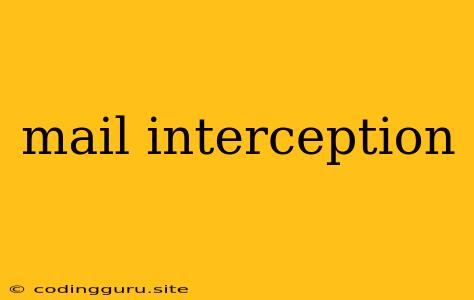What is Mail Interception and Why Should You Care?
In the digital age, email has become an essential communication tool for both personal and professional purposes. It's where we share sensitive information, conduct business deals, and stay connected with loved ones. But this reliance on email also makes it a prime target for malicious actors. That's where mail interception comes in, a serious threat that can have devastating consequences.
Mail interception refers to the unauthorized access and reading of email messages in transit. It's like someone eavesdropping on your phone conversations but with even greater potential for damage. Hackers can use various techniques to intercept your emails, ranging from simple sniffing to sophisticated phishing schemes.
How Does Mail Interception Happen?
Mail interception can occur at several points along the email delivery chain. Let's explore some common methods:
- Man-in-the-middle (MitM) attacks: Imagine a scenario where a hacker intercepts the communication between your email client and the email server. They could then read, modify, or even redirect your emails, making it seem like they're coming from a legitimate source.
- Network sniffing: Hackers can use tools to monitor network traffic and capture email data. This method is often used in public Wi-Fi networks, where security is usually weaker.
- Phishing: This involves sending emails that appear to be from legitimate sources, such as banks or online retailers, to trick recipients into revealing sensitive information like login credentials or credit card details. This information can then be used for mail interception.
- Malware: Certain malware can be used to capture email data from your computer. They can silently run in the background, logging your keystrokes, including passwords and other sensitive information.
What are the Risks of Mail Interception?
Mail interception poses significant risks to individuals and businesses alike:
- Data theft: Hackers can steal sensitive information such as financial details, login credentials, and personal data.
- Financial losses: Unauthorized access to your email account can lead to financial fraud, including unauthorized transactions and identity theft.
- Reputational damage: Compromised emails can be used to spread misinformation, harm your reputation, and damage relationships with clients and partners.
- Legal issues: If you're handling sensitive data, mail interception can have serious legal consequences.
- Business disruptions: Intercepted emails can disrupt business operations, leading to delays, lost revenue, and compromised negotiations.
How Can You Protect Yourself from Mail Interception?
Protecting yourself from mail interception requires a multifaceted approach:
- Use strong passwords: Create complex passwords and avoid using the same one across multiple accounts. Enable two-factor authentication whenever possible for added security.
- Be cautious of suspicious emails: Never open attachments or click on links in emails from unknown senders. Always verify the sender's identity before providing sensitive information.
- Use reputable email providers: Choose email providers with a strong security track record and robust encryption protocols.
- Install security software: Install and keep your antivirus and anti-malware software up to date to protect against threats that can lead to mail interception.
- Use VPNs: When using public Wi-Fi networks, consider using a Virtual Private Network (VPN) to encrypt your internet traffic and prevent data interception.
- Be aware of your surroundings: Avoid using public Wi-Fi for sensitive transactions and be mindful of your surroundings, especially when accessing sensitive information.
How to Detect Mail Interception
While it's not always easy to know if your emails are being intercepted, there are some telltale signs to watch out for:
- Emails are delayed or missing: If you notice your emails are taking longer than usual to arrive or are disappearing altogether, it could be a sign of mail interception.
- Emails are being read before you: If you send a draft of an email to yourself and notice changes or additions to the content, it's a strong indication that someone may be intercepting your emails.
- Suspicious activity in your account: Check your email account for any unusual activity such as unexpected login attempts or changes in settings.
Tips for Secure Email Communication
Here are some tips for maintaining secure email communication:
- Use encrypted email services: Consider using encrypted email services like ProtonMail or Tutanota for added security. These services use end-to-end encryption to protect your emails from unauthorized access.
- Use email aliases: Create separate email aliases for different purposes to limit the amount of sensitive information you expose in each account.
- Avoid sharing personal information in emails: Whenever possible, avoid sending sensitive information like financial details, passwords, or personal data in emails. Instead, use secure messaging platforms or direct phone calls.
- Stay informed: Keep yourself updated on the latest email security threats and best practices to stay ahead of potential threats.
Conclusion
Mail interception is a serious threat that can have devastating consequences. By understanding the risks, taking proactive measures, and remaining vigilant, you can significantly reduce your chances of becoming a victim. Remember to prioritize email security and adopt a multi-layered approach to protect yourself and your data.
